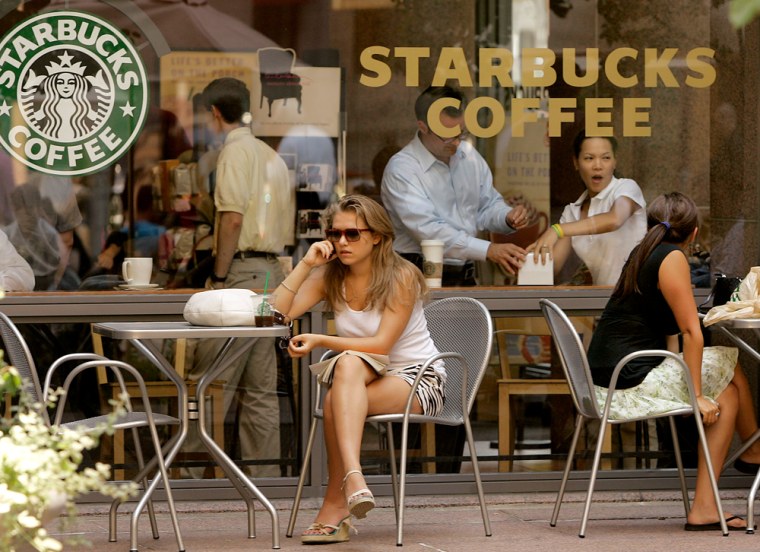Adam Howitt, a 33-year-old British entrepreneur, pecks away on a laptop in the corner of a downtown Chicago Starbucks. He's sipping a tall Sumatra blend, black. He'll drink almost anything when he's out and about, he says, including 7-Eleven's brew. When it comes to coffee at home, he grinds his own Starbucks beans. But he won't go near supermarket brands such as Folgers or Maxwell House. "There's just no taste comparison between cans and beans," he says. "Cans are just bad."
It's a grind these days for the biggest makers of grocery-store coffee. Procter & Gamble and Kraft Foods are facing sluggish sales for their hallmark Folgers and Maxwell House brews — and the demographics are moving against them. Youngsters drink far less coffee than their baby boomer parents, and, when they do, it's more likely to be on the go. Only 37% of young adults between 18 to 24 drink coffee, compared with 60% for those between 40 and 59 and 74% for Americans over 60, according to National Coffee Assn. data.
Slack supermarket brands
Coffee is still a growing market. Overall consumption rose by 9% a year between 2001 and 2006. The problem for P&G and Kraft is that their supermarket brands no longer cut it with consumers who have gotten hooked on the darker, richer brews from Starbucks, Dunkin' Donuts, and even McDonald's. "Retail coffee is unexciting," says Robert Goldin, executive vice-president of Chicago food consultancy Technomic.
Now the pressure is rising on Kraft and P&G to dump their dull drips. Investors have called on Kraft to divest its slow-growing Maxwell House, though company executives say they're committed to the brand. P&G recently hired Blackstone Group to advise it on selling Folgers and several other brands, according to a report earlier this month in the Financial Times. Spokesmen for P&G and Blackstone declined comment on possible divestiture of the remaining food brands. "The dynamics have changed," Goldin says. "There's a limit to what you can do with the category."
It's not for lack of trying. Procter has recently started distributing Dunkin' Donuts coffee at supermarkets, while Kraft handles the Starbucks brand. Still, the labels have been slow to ratchet up the quality of their canned coffee, perhaps for fear that their core customer wouldn't tolerate a twofold or threefold price increase for well, supermarket coffee.
Competing with coffeehouses
Innovation may have been slow in coming because of a fundamental misperception. "Our frame of reference was coffee sold in the grocery store," admits Rick Searer, president of Kraft's North American business. "We competed with Folgers." Kraft is just now reformulating its basic Maxwell House blend with 100% Arabica beans.
But the fact is that the growth in coffee is coming from coffee on the run. Coffee sold through restaurants grew at a compound annual growth rate of 15.2% between 2001 and 2006, according to the National Coffee Assn. in Washington, D.C. Supermarket sales grew only marginally and are slated to grow at a compound annual growth rate of 1% through 2011, the National Coffee Assn. predicts.
Still, the mainstay coffee brands are huge. Kraft says Maxwell House is one of seven Kraft brands that generate more than $1 billion in annual sales.
Perking up with private equity
Folgers, and its companion Millstone brand, is also a profitable, $1 billion franchise with far-flung distribution that could be attractive to a buyer. Folgers might be logical target for a private equity firm that makes big returns by repositioning older franchises. Folgers also might benefit from the full attention of an owner that is willing to take risks on its formula, positioning, and advertising.
For P&G, Folgers and Pringle's potato chips are the last food products remaining at the company. The consumer-products giant divested most of its food portfolio over the past 10 years, saying goodbye to Crisco oils, JIF peanut butter, Duncan Hines cake mixes, and Hawaiian Punch. It may make sense for the company to let someone else try to figure out how to revive Folgers, so it can focus on its more prominent businesses. "P&G has bigger fish to fry," says Goldin.
